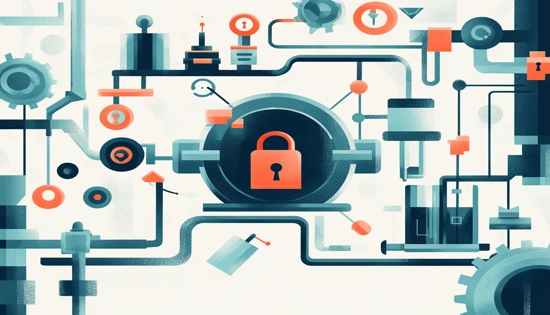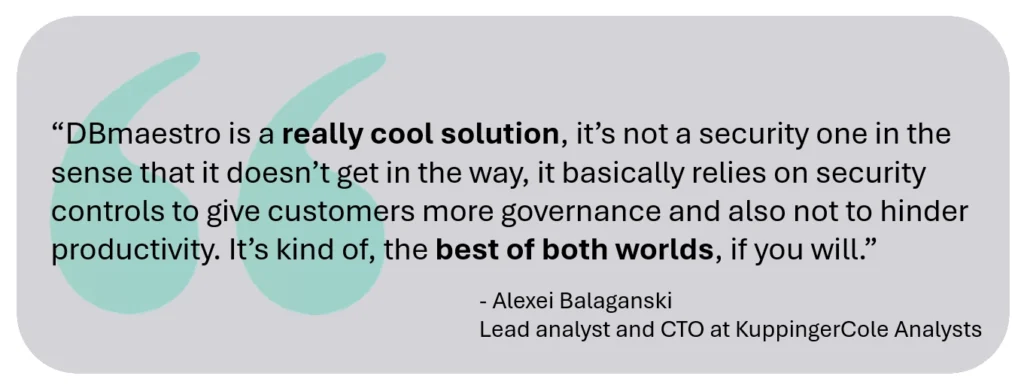Secure database DevOps involves incorporating security measures throughout the entire development lifecycle, from planning and coding to testing, deployment, and maintenance. This approach helps prevent data breaches, maintain compliance, and ensure system integrity by addressing security concerns at every stage of the process.
Understanding Secure Database DevOps
Secure database DevOps involves incorporating security measures throughout the entire development lifecycle, from planning and coding to testing, deployment, and maintenance. This approach helps prevent data breaches, maintain compliance, and ensure system integrity by addressing security concerns at every stage of the process.
The Importance of Security in DevOps for Databases
Integrating security into DevOps is essential for several reasons:
- Preventing data breaches: By embedding security practices into the development process, organizations can identify and address vulnerabilities early, reducing the risk of data breaches.
- Maintaining compliance: Secure database DevOps helps ensure adherence to regulatory requirements and industry standards, avoiding costly penalties and reputational damage.
- Ensuring system integrity: By implementing security measures throughout the development lifecycle, organizations can maintain the integrity of their database systems, preventing unauthorized access and data manipulation.

Why Traditional Database Security Approaches No Longer Work
Traditional security models often rely on perimeter-based defenses and periodic security audits. However, these approaches are insufficient in modern DevOps environments due to:
- Rapid development cycles
- Frequent deployments
- Distributed systems and cloud-based infrastructure
- Increasing sophistication of cyber threats
The Intersection of Security and DevOps: Why It Matters
Integrating security into DevOps, often referred to as DevSecOps, allows organizations to:
- Identify and address security issues early in the development process
- Automate security testing and compliance checks
- Foster collaboration between development, operations, and security teams
- Maintain agility while enhancing overall security posture
Common Security Challenges in Database DevOps
Some key risks in database DevOps include:
- Misconfigurations leading to exposed data
- Unpatched vulnerabilities in database systems
- Weak access controls and privilege management
- Insecure CI/CD pipelines that can introduce vulnerabilities
- Lack of visibility into database activities and changes
Best Practices for Secure Database DevOps
To embed security into DevOps processes without disrupting agility and performance, consider the following best practices:
Implementing DevSecOps for Continuous Security
DevSecOps ensures that security is integrated into every stage of the database DevOps pipeline. This approach involves:
- Conducting security assessments during the planning phase
- Implementing secure coding practices and code reviews
- Automating security testing as part of the CI/CD pipeline
- Continuously monitoring for security threats and vulnerabilities
Automating Database Security Policies and Compliance Checks
Leverage automation tools to enforce security policies, detect vulnerabilities, and ensure regulatory compliance. This can include:
- Automated vulnerability scanning
- Configuration management tools to enforce security baselines
- Compliance checking tools to ensure adherence to regulatory standards

Role-Based Access Control (RBAC) and Least Privilege Access
Implement RBAC and least privilege principles to minimize security risks by restricting access to databases based on user roles. This involves:
- Defining clear roles and responsibilities
- Granting minimal necessary permissions for each role
- Regularly reviewing and updating access controls
Continuous Monitoring and Threat Detection
Utilize real-time monitoring and AI-driven threat detection to identify security breaches proactively. This can include:
- Database activity monitoring (DAM) tools
- Security information and event management (SIEM) systems
- User and entity behavior analytics (UEBA) to detect anomalies
Essential Tools for Secure Database DevOps
To implement secure database DevOps effectively, consider a tool like DBmaestro which provides the following:
- Security scanners for identifying vulnerabilities
- CI/CD security integrations for automated testing
- Database auditing solutions for tracking changes and access
- Cloud security frameworks for protecting cloud-based databases
Key Takeaways
- Integrate security throughout the entire database DevOps lifecycle.
- Automate security testing and compliance checks to maintain agility.
- Implement role-based access control and least privilege principles.
- Utilize continuous monitoring and threat detection tools.
- Foster collaboration between development, operations, and security teams.
Conclusion
Secure database DevOps is essential for building resilient systems that can withstand the evolving threat landscape while maintaining the agility required in modern development environments. By integrating security practices throughout the DevOps lifecycle, organizations can significantly reduce the risk of data breaches, ensure compliance, and maintain the integrity of their database systems.
To implement secure database DevOps successfully, organizations must embrace a culture of security awareness, leverage automation tools, and foster collaboration between teams. By doing so, they can create a robust security posture that adapts to new threats while enabling continuous innovation and delivery.
Leveraging DBmaestro for Secure Database DevOps
For organizations looking to automate, secure, and govern their database CI/CD pipelines, DBmaestro offers a comprehensive solution. With features such as database release automation, security and compliance automation, and source control, DBmaestro integrates seamlessly into existing DevOps toolchains. It supports compliance with regulations like GDPR, SOX, and HIPAA, ensuring that databases meet stringent regulatory standards. By leveraging DBmaestro, organizations can accelerate database releases, mitigate risks, and improve quality while maintaining a high level of security and compliance.
Ready to enhance your database DevOps security? Explore DBmaestro’s solutions for automated database deployments and security management. Contact us today to learn how we can help you build more resilient database systems.






